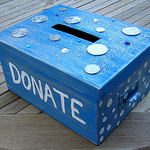 When someone solicits you for some of your of your time, money or energy, do you know why you respond by donating? You may believe you are motivated to give because you are responding to something you care about – political, social or health related issues. It may also be unpredictable events, tragedies or disasters, just as easily as it’s giving for holidays, celebrations and responding to strangers in need.
When someone solicits you for some of your of your time, money or energy, do you know why you respond by donating? You may believe you are motivated to give because you are responding to something you care about – political, social or health related issues. It may also be unpredictable events, tragedies or disasters, just as easily as it’s giving for holidays, celebrations and responding to strangers in need.
According to economics professor William Harbaugh from the University of Oregon, there are three theories about motivated giving:
-
Altruism – pleasure from giving for benefits or public good (includes taxation)
-
Warm glow – pleasure of freely giving to what one chooses
-
Social status – pleasure from enhanced standing among peers and/or within a community
What was of interest to professor Harbaugh and his research colleagues was how this motivation related to pleasure center in the brain. General pleasure generating experiences “… all evoke neural signal that converge on a small group of interconnected brain areas called the “medial forebrain pleasure circuit” in which the neurotransmitter dopamine plays a crucial role. It is in these tiny clumps of neurons that human pleasure is felt. This dopamine-using pleasure circuitry can also be co-opted by some, but not all, psychoactive substances like cocaine, nicotine, heroin or alcohol.”
In a small study Harbaugh found “… brain scanning results showed over the entire population that, just like receiving money, both taxation and charitable giving activated nearly overlapping regions of the pleasure circuit. However, on average, charitable giving produced a stronger activation of this pleasure center than did taxation.” Commentary on the study points out flaws in using subjects from a liberal locale and the charity being a food bank and how results may have differed if the charity was more controversial.
In another brain study looking at social status and being a recipient of a lot of money, Norihiro Sadato and colleagues from the National Institute of Physiological Sciences in Japan, found MRI scanning results indicated overlapping brain areas. “The main finding was that the most positive social reward descriptors activated portions of the reward circuit-most notably the nucleus accumbens and the dorsal striatum-that substantially overlapped with those activated in the monetary reward task.”
Both studies infer the brain’s circuit reward center is being activated during events of charitable donations. It also appears to reinforce motivated acts of giving in the future.
The next time you contribute know that you are not only rewarding the recipient but your brain in rewarding you with that feel good feeling of giving.
Sources:
http://www.psychologytoday.com/blog/the-compass-pleasure/201108/is-your-brain-charitable-giving
http://brainwaves.corante.com/archives/2007/06/18/why_giving_feels_good_your_charitable_brain.php
Photo Credit: Mindful One, Kathryn Harper, creative commons use
You Can Find Me At -


Leave a Reply